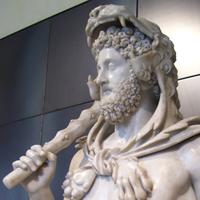Hercules IX: FF 52-56
52. Hercules Stygem Transit
Hercules postquam imperia Eurysthei accepit, in Laconiam ad Taenarum statim se contulit; ibi enim spelunca erat ingenti magnitudine, per quam, ut tradebatur, homines ad Orcum descendebant. Eo cum venisset, ex incolis quaesivit quo in loco spelunca illa sita esset; quod cum cognovisset, sine mora descendere constituit. Nec tamen solus hoc iter faciebat, Mercurius enim et Minerva se ei socios adiunxerant. Ubi ad ripam Stygis venit, Hercules scapham Charontis conscendit, ut ad ulteriorem ripam transiret. Cum tamen Hercules vir esset ingenti magnitudine corporis, Charon solvere nolebat; magnopere enim verebatur ne scapha sua tanto pondere onerata in medio flumine mergeretur. Tandem tamen minis Herculis territus Charon scapham solvit, et eum incolumem ad ulteriorem ripam perduxit.
53. Labor Ultimus Perfectus Est
Postquam flumen Stygem hoc modo transiit, Hercules in sedem ipsius Plutonis venit; et postquam causam veniendi docuit, ab eo petivit ut Cerberum auferre sibi liceret. Pluto, qui de Hercule famam acceperat, eum benigne excepit, et facultatem quam ille petebat libenter dedit. Postulavit tamen ut Hercules ipse, cum imperata Eurysthei fecisset, Cerberum in Orcum rursus reduceret. Hercules hoc pollicitus est, et Cerberum, quem non sine magno periculo manibus prehenderat, summo cum labore ex Orco in lucem et ad urbem Eurysthei traxit. Eo cum venisset, tantus timor animum Eurysthei occupavit ut ex atrio statim refugerit; cum autem paulum se ex timore recepisset, multis cum lacrimis obsecravit Herculem ut monstrum sine mora in Orcum reduceret. Sic contra omnium opinionem duodecim illi labores quos Pythia praeceperat intra duodecim annos confecti sunt; quae cum ita essent, Hercules servitute tandem liberatus magno cum gaudio Thebas rediit.
54. Nessus Centaur
Postea Hercules multa alia praeclara perfecit, quae nunc perscribere longum est. Tandem iam aetate provectus Deianiram, Oenei filiam, in matrimonium duxit; post tamen tris annos accidit ut puerum quendam, cui nomen erat Eunomus, casu occiderit. Cum autem mos esset ut si quis hominem casu occidisset, in exsilium iret, Hercules cum uxore sua e finibus eius civitatis exire maturavit. Dum tamen iter faciunt, ad flumen quoddam pervenerunt in quo nullus pons erat; et dum quaerunt quonam modo flumen transeant, accurrit centaurus Nessus, qui viatoribus auxilium obtulit. Hercules igitur uxorem suam in tergum Nessi imposuit; tum ipse flumen tranavit. Nessus autem paulum in aquam progressus ad ripam subito revertebatur et Deianiram auferre conabatur. Quod cum animadvertisset Hercules, ira graviter commotus arcum intendit et pectus Nessi sagitta transfixit.
55. Vestis
Nessus igitur sagitta Herculis transfixus moriens humi iacebat; at ne occasionem sui ulciscendi dimitteret, ita locutus est: "Tu, Deianira, verba morientis audi. Si amorem mariti tui conservare vis, hunc sanguinem qui nunc e pectore meo effunditur sume ac repone; tum, si umquam in suspicionem tibi venerit, vestem mariti hoc sanguine inficies." Haec locutus Nessus animam efflavit; Deianira autem nihil mali suspicata imperata fecit. Paulo post Hercules bellum contra Eurytum, regem Oechaliae, suscepit; et cum regem ipsum cum filiis interfecisset, Iolen eius filiam captivam secum reduxit. Antequam tamen domum venit, navem ad Cenaeum promunturium appulit, et in terram egressus aram constituit, ut Iovi sacrificaret. Dum tamen sacrificium parat, Licham comitem suum domum misit, qui vestem albam referret; mos enim erat apud antiquos, dum sacrificia facerent, albam vestem gerere. At Deianira verita ne Hercules amorem erga Iolen haberet, vestem priusquam Lichae dedit, sanguine Nessi infecit.
56. Hercules Mortuus Est
Hercules nihil mali suspicans vestem quam Lichas attulerat statim induit; paulo post tamen dolorem per omnia membra sensit, et quae causa esset eius rei magnopere mirabatur. Dolore paene exanimatus vestem detrahere conatus est; illa tamen in corpore haesit, neque ullo modo abscindi potuit. Tum demum Hercules quasi furore impulsus in montem Octam se contulit, et in rogum, quem summa celeritate exstruxit, se imposuit. Hoc cum fecisset, eos qui circumstabant oravit ut rogum quam celerrime succenderent. Omnes diu recusabant; tandem tamen pastor quidam ad misericordiam inductus ignem subdidit. Tum, dum omnia fumo obscurantur, Hercules densa nube velatus a Iove in Olympum abreptus est.

